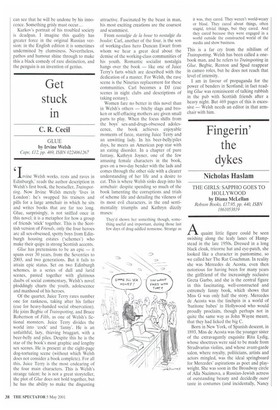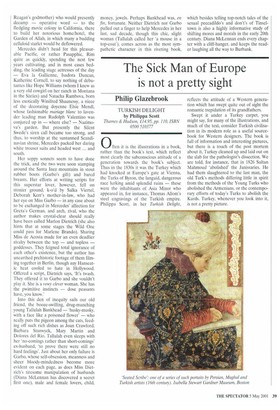Fingerin' the dykes
Nicholas Haslam
THE GIRLS: SAPPHO GOES TO HOLLYWOOD by Diana McLellan Robson Books, £17.95, pp. 440, ISBN 1861053819 Aquaint little figure could be seen swishing along the leafy lanes of Hampstead in the late 1950s. Dressed in a long black cloak, tricorne hat and eye-patch, she looked like a character in pantomime, so we called her The Rat Coachman. In reality she was Mercedes de Acosta, even then notorious for having been for many years the girlfriend of the increasingly reclusive Greta Garbo, and she is the central figure in this fascinating, well-constructed and extremely funny book, which shows that Miss G was only half the story. Mercedes de Acosta was the linchpin in a world of 'baritone babes' in Hollywood who would proudly proclaim, though perhaps not in quite the same way as John Wayne meant, that they had licked the big C.
Born in New York, of Spanish descent, in 1893, Miss de Acosta was the younger sister of the extravagantly exquisite Rita Lydig, whose shoetrees were said to be made from Stradivarius violins, and whose avant-garde salon, where royalty, politicians, artists and actors mingled, was the ideal springboard for Mercedes' aspirations as poet and playwright. She was soon in the Broadway circle of Alla Nazimova, a Russian-Jewish actress of outstanding beauty and decidedly outré taste in costumes (and incidentally, Nancy Reagan's godmother) who would presently decamp — operative word — to the fledgling movie colony in California, there to build her notorious home/hotel, the Garden of Allah, in which many a budding celluloid starlet would be deflowered.
Mercedes didn't head for this pleasurable Pacific, or rather Pasapphic. Rim quite as quickly, spending the next few years cultivating, and in most cases bedding, the leading stage actresses of the day — Eva la Gallienne, Isadora Duncan, Katherine Cornell, to say nothing of debutantes like Hope Williams (whom I knew as a very old cowgirl on her ranch in Montana in the Sixties) and Natacha Rambova, born less exotically Winifred Shaunessy, a niece of the decorating doyenne Elsie Mena whose fashionable manage blanc to lavender leading man Rudolph Valentino was conjured up in — where else? — Nazimova's garden. But presently the Silent Swede's siren call became too strong, and thus, to worship at the suntanned Scandinavian shrine, Mercedes packed her daring white trouser suits and headed west ... and south.
Her soppy sonnets seem to have done the trick, and the two were soon stamping around the Santa Inez mountains in stout rubber boots (Garbo's gift) and bared breasts. Her efforts at writing scripts for this superstar lover, however, fell on stonier ground, k-o'd by Salka Viertel, Deborah Kerr's mother-in-law, who had her eye on Miss Garbo — in any case about to be exchanged in Mercedes' affection for Greta's German, and arch, rival, who the author makes crystal-clear should really have been called Marlon Dietrich (she also hints that at some stages the Wild One could pass for Marlene Brando). Sharing Miss de Acosta made for an even deadlier rivalry between the top — and topless — goddesses. They feigned total ignorance of each other's existence, but the author has unearthed prehistoric footage of them filming together in Berlin, though any Hanseatic heat cooled to hate in Hollywood. Offered a script, Dietrich says, 'It's twash. They offered it to Garbo and she vouldn't play it. She is a vewy, clever woman. She has the pwimitive instincts — dose peasants have, you know.'
Into this den of inequity sails our old friend, the booze-swilling, drug-munching young Tallulah Bankhead — 'husky-musky, with a face like a poisoned flower' — who really puts the pigeon among the cats, feeding off such rich dishes as Joan Crawford, Barbara Stanwyck, Mary Martin and Dolores del Rio. Tallulah even sleeps with her 'no-comings rather than short-comings' ex-husband, `to prove there were still no hard feelings'. Just about her only failure is Garbo, whose self-obsession, meanness and sheer bloody-mindedness become more evident on each page, as does Miss Dietrich's tiresome manipulation of husbands (Diana McLennan has discovered a secret first one), male and female lovers, child, money, jewels. Perhaps Bankliead was, en fin, fortunate. Neither Dietrich nor Garbo pulled out a finger to help Mercedes in her last, sad decade, though this chic, slight woman (Tallulah called her 'a mouse in a top-coat'), comes across as the most sympathetic character in this riveting book, which besides telling top-notch tales of the sexual peccadildo's and don't's of Tinseltown is also a highly informative study of shifting mores and morals in the early 20th century. Diana McLennan ends every chapter with a cliff-hanger, and keeps the reader laughing all the way to Burbank.











































































 Previous page
Previous page